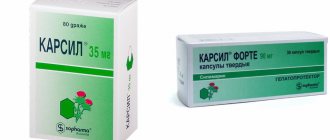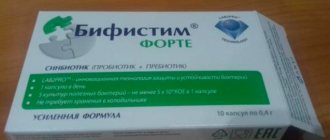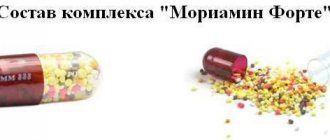Compound
Each capsule contains lecithin (300 mg phosphatidylcholine), thiamine mononitrate, nicotinamide, cyanocobalamin, tocopherol acetate, riboflavin, pyridoxine hydrochloride .
Additional components: anhydrous vegetable oil, soybean oil, white wax.
Capsule shell composition: iron oxide (yellow, red, black), glycerin, gelatin, titanium dioxide and purified water.
Composition and release form
| Capsules | 1 caps. |
| lecithin (containing 300 mg phosphatidylcholine) | 857.13 mg |
| Vitamin E (tocopheryl acetate) | 10 mg |
| vitamin B1 (thiamine mononitrate) | 10 mg |
| vitamin B2 (riboflavin) | 6 mg |
| vitamin B6 (pyridoxine hydrochloride) | 10 mg |
| vitamin B12 (cyanocobalamin) | 0.01 mg |
| nicotinamide | 30 mg |
| excipients: soybean oil, anhydrous vegetable oil, white wax | |
| capsule composition: gelatin; glycerol; purified water; titanium dioxide; iron oxide red; iron oxide black; iron oxide yellow |
in a blister pack 10 pcs., in a cardboard pack 1 or 3 packs.
pharmachologic effect
Hepatoprotector . The active components are “essential” phospholipids , the main components of which are:
- phosphatidylcholine;
- polyunsaturated fatty acids (linolenic, linoleic and oleic).
The medication contains phosphatidylcholine in the form of a highly purified fraction, which is obtained by isolation from soybeans. The fraction is rich in polysaturated fatty acids, due to which most of the drug is retained in the duodenum without being exposed to phospholipase A2. A significant amount of “essential” phospholipids is integrated into subcellular and cellular membranes after entering the blood.
The drug improves the functional state of the hepatic system, has a positive effect on the regulation of lipid and carbohydrate metabolism , prevents the formation and spread of connective tissue in the liver, helps restore and preserve the structure of hepatocytes , and improves detoxification function.
Additional components of the medication are B vitamins and vitamin E.
- Vitamin B1 acts as a coenzyme in carbohydrate metabolism processes.
- Vitamin B2 is a catalyst for cellular respiration.
- Vitamin B6 is involved in protein metabolism and amino acid metabolism as a coenzyme.
- Vitamin B12 is necessary for the synthesis of nucleotides (together with folic acid).
- Vitamin PP takes part in carbohydrate and fat metabolism and in the processes of tissue respiration.
- Vitamin E protects unsaturated fatty acids from lipid peroxidation in membranes. Is an antioxidant .
Livolin Forte capsules No. 30
Compound
Active ingredients:
Excipients: soybean oil, hydrogenated vegetable oil, white beeswax.
Indications for use
As part of complex therapy: chronic hepatitis, cirrhosis, fatty liver degeneration of various etiologies (including diabetes), toxic liver damage (alcohol, drugs);
psoriasis. If necessary, please consult your doctor before using the medicine.
Contraindications
Children under 18 years of age; hypersensitivity to the components of the combination.
Directions for use and doses
As part of complex therapy: chronic hepatitis, cirrhosis, fatty liver degeneration of various etiologies (including diabetes mellitus), toxic liver damage (alcohol, drugs) - orally, 1-2 capsules 2-3 times a day with meals. a small amount of water. The course of treatment is 3 months; if necessary, it can be continued or repeated after consultation with a doctor.
For psoriasis, 1 capsule 3 times a day. The course of treatment is 1-3 months (as part of combination therapy).
If there is no improvement after treatment or new symptoms appear, you should consult your doctor.
Use the drug only according to the method of use and in the doses indicated in the instructions for use.
If necessary, please consult your doctor before using the medicine.
Storage conditions
In a dry place, protected from light, at a temperature not exceeding 25°C.
Keep out of the reach of children.
Best before date
2 years. Do not use after expiration date.
special instructions
When used in high doses, urine turns bright yellow (due to the presence of riboflavin (vitamin B2) in the drug).
The drug contains white beeswax, this must be kept in mind for patients with intolerance to bee products.
Description
Hepatoprotective agent.
Dosage form
Soft gelatin capsules, brown; The contents of the capsules are a pasty mass of dark yellow color.
Use in children
The use of the drug is contraindicated in children and adolescents under 18 years of age.
Pharmacodynamics
Combined drug. The phospholipids included in the composition are the main elements in the structure of the cell membrane and mitochondria. Vitamins function as coenzymes in the processes of oxidative decarboxylation. The drug prevents vitamin deficiency, normalizes carbohydrate, protein and fat metabolism, improves the functional state of the liver, its detoxification function, helps preserve and restore the structure of hepatocytes; inhibits the formation of connective tissue in the liver.
Alpha-tocopherol acetate (vitamin E) has antioxidant properties and protects unsaturated fatty acids in membranes from lipid peroxidation; participates in the formation of intercellular substance, collagen and elastic fibers of connective tissue, smooth muscles of blood vessels, and the digestive tract.
Thiamine mononitrate (vitamin B1) is a necessary factor for the transmission of nerve impulses in all tissues and the central nervous system (CNS) itself, and participates as a coenzyme in carbohydrate metabolism.
Riboflavin (vitamin B2) is a catalyst for the processes of cellular respiration and peroxidation of endogenous substances and xenobiotics, glucuronidation.
Pyridoxine hydrochloride (vitamin B6) as a coenzyme takes part in the metabolism of amino acids and proteins and in the synthesis of neurotransmitters.
Nicotinamide stabilizes the processes of tissue respiration, fat and carbohydrate metabolism, and the xenobiotic metabolism system.
Cyanocobalamin (vitamin B12), together with folic acid, is involved in the synthesis of nucleotides, in the formation of red blood cells and nerve sheath cells, and is necessary for the growth of the body.
Side effects
Allergic reactions (itching, urticaria), nausea, abdominal pain.
If any of the side effects listed in the instructions get worse, or you notice any side effects not listed in the instructions, tell your doctor.
Use during pregnancy and breastfeeding
Before using Livolin Forte, if you are pregnant, or think you might be pregnant, or are planning a pregnancy, you should consult your doctor.
During breastfeeding, you should consult your doctor before using Livolin Forte.
Clinical trials have not been conducted in pregnant women or during breastfeeding. The use of the drug during pregnancy is possible only on the recommendation of a doctor if the expected benefit to the mother outweighs the potential risk to the fetus.
If it is necessary to take the drug during lactation, it is recommended to decide on stopping breastfeeding.
Interaction
- Pyridoxine hydrochloride (vitamin B6) increases the decarboxylation of levodopa in peripheral tissues.
- Laxatives containing mineral oil and cholestyramine reduce the absorption of alpha-tocopherol acetate (vitamin E).
- Biguanides reduce the absorption of cyanocobalamin (vitamin B12).
- Fluorouracil, vinblastine, bleomycin, tsnsplatin interfere with the absorption of thiamine mononitrate (vitamin B1), pyridoxine hydrochloride (vitamin B6); penicillamine, isoniazid reduce the effectiveness of thiamine mononitrate (vitamin B1), increasing its excretion.
- Isoniazid reduces the effectiveness of pyridoxine hydrochloride (vitamin B6).
Overdose
Possible overdose may lead to symptoms of gastrointestinal discomfort (nausea, abdominal pain, diarrhea).
Treatment is symptomatic.
Indications for use
Livolin Forte is one of the components of complex treatment of the following diseases and conditions:
- hepatitis of toxic origin;
- fatty liver due to chronic infectious processes, diabetes mellitus ;
- hepatic cirrhosis;
- hepatitis in the acute stage;
- toxicosis of pregnant women;
- chronic hepatitis;
- psoriasis;
- intoxication;
- radiation sickness;
- disturbances in the functioning of the hepatic system against the background of somatic pathology.
Nosological classification (ICD-10)
- K71 Liver toxicity
- K72.0 Acute and subacute liver failure
- K73.9 Chronic hepatitis, unspecified
- K74 Fibrosis and cirrhosis of the liver
- K76.0 Fatty liver degeneration, not elsewhere classified
- K77 Liver lesions in diseases classified elsewhere
- L40 Psoriasis
- O14.9 Preeclampsia [nephropathy] unspecified
- T50.9 Other and unspecified drugs, medicinal products and biological substances
- T51 Toxic effects of alcohol
- W88 Exposure to ionizing radiation
- Z51.0 Radiotherapy course
special instructions
In patients with anemia , before prescribing Livolin Forte, it is recommended to exclude a disease such as B12 deficiency anemia .
The medication is not prescribed to women over 35 years of age with a diagnosed history of recurrent miscarriage.
Not recommended for use with increased uterine tone.
Urine may turn amber-bright yellow, which is due to the excretion of metabolic products of riboflavin, one of the active components of the drug.
If the patient has a history of nephrourolithiasis , then a study is conducted to determine the daily excretion of Ca2+ during urination.
Analogues of Livolin Forte
Level 4 ATC code matches:
Essential phospholipids
Galstena
Fosphonziale
Essentiale forte N
Essentiale
Essliver forte
Eslidin
Structural substitutes with absolutely identical quantitative composition of active components have not been developed. Medicines with similar pharmacological effects:
- Wellman;
- Heptral;
- Biovital;
- Vitamax;
- Eslidin;
- Vitrum Beauty;
- Doppelhertz;
- Phosphogliv;
- Gerimaks Energy;
- Pantovigar;
- Complivit;
- Revalid.
Reviews of Livolin Forte
Elderly patients note that during treatment with the drug, the level of total cholesterol . This effect is achieved by normalizing metabolism in the liver, which prevents cholesterol from accumulating in the hepatic system. Additional components are B vitamins, which make it possible to compensate for their deficiency in various forms of vitamin deficiency . Therapy with Livolin Forte is well tolerated and rarely causes adverse reactions in the form of allergic responses ( urticaria ).
Livolin Forte
Combined drug. The action is due to the effects of vitamins, macro- and microelements included in its composition; has a multivitamin and metabolic effect. Prevents vitamin deficiency, normalizes carbohydrate, protein and fat metabolism, stimulates the body's immune defense, accelerates recovery from fatigue, and reduces the damaging effects of adverse environmental factors.
Retinol (vitamin A) is involved in the formation of visual pigments necessary for normal twilight and color vision; ensures the integrity of epithelial tissues, regulates bone growth.
Tocopherol (vitamin E) has antioxidant properties and protects unsaturated fatty acids in membranes from lipid peroxidation; participates in the formation of intercellular substance, collagen and elastic fibers of connective tissue, smooth muscles of blood vessels, and the digestive tract.
Colecalciferol (vitamin D) regulates the exchange of Ca2+ and phosphorus, the process of building bone structure; increases Ca2+ absorption in the intestine, protein synthesis in the small intestine, liver and bones; excretion of phosphates by the kidneys.
Vitamin K is involved in the synthesis of the prothrombin complex, which is optimal for blood clotting processes.
Thiamine (vitamin B1) is a necessary factor for the transmission of nerve impulses in all tissues and the central nervous system itself; it participates as a coenzyme in carbohydrate metabolism.
Riboflavin (vitamin B2) is a catalyst for the processes of cellular respiration and peroxidation of endogenous substances and xenobiotics, glucuronidation.
Panthenol (vitamin B5) is a component of coenzyme A and is involved in the processes of acetylation and oxidation of carbohydrates and fats, the synthesis of fatty acids and steroids from carbohydrates, and the implementation of the connections of glycolysis, the Krebs cycle and fat oxidation.
Pyridoxine (vitamin B6) as a coenzyme takes part in the metabolism of amino acids and proteins and in the synthesis of neurotransmitters.
Folic acid is involved in the synthesis of amino acids, nucleotides, and nucleic acids; necessary for normal erythropoiesis. Reduces the percentage of congenital deformities.
Cyanocobalamin (vitamin B12), together with folic acid, is involved in the synthesis of nucleotides, in the formation of red blood cells and nerve sheath cells, and is necessary for the growth of the body. Cobalt is a serotonin antagonist; participates in the metabolism of fatty acids, the reduction of methionine, and the metabolism of folic acid.
Nicotinamide (vitamin PP) stabilizes the processes of tissue respiration, fat and carbohydrate metabolism, and the xenobiotic metabolism system.
Biotin (vitamin H) plays an important role in the metabolism of carbohydrates and fatty acids.
Ascorbic acid (vitamin C) ensures collagen synthesis, participates in the metabolism of folic acid and Fe, in the synthesis of steroid hormones and catecholamines.
Ginseng extract and deanol restore performance, stimulate brain activity and physical activity.
Mg2+ reduces the excitability of neurons and the transmission of nerve impulses to muscles, participates as a cofactor in many enzymatic reactions (activation of cholinesterase, adenylate cyclase, CPK, pyruvate carboxylase, alkaline phosphatase, oxidative phosphorylation enzymes; connection of messenger RNA with free ribosomes); acts as a BMKK in myosin ATPase and inhibits Na+/K+ ATPase.
Fe is a necessary element for erythropoiesis, as part of Hb and myoglobin it ensures the transport of oxygen to tissues; takes part in the work of Krebs cycle enzymes, reduction and oxidation reactions, as well as the synthesis of fatty acids and glucose; optimizes dopamine functions.
Zn2+ is involved in the metabolism of nucleic acids, proteins, fats, carbohydrates, fatty acids, in the metabolism of hormones (including sex hormones), and the synthesis of Pg; antagonist of toxic cadmium.
Cu2+ - takes part in the implementation of the effects of vitamins A, E, P, PP, C and Fe; stimulates Hb synthesis, phagocytosis, growth, development and reproduction of all tissues; affects mitochondrial and microsomal oxidation of many endogenous substances, including amino acids, biologically active amines, fats; plays a vital role in the synthesis of collagen and elastin.
The main function of boron is to regulate the optimal functioning of the parathyroid glands, either through the synthesis of membrane permeability mediators, or by changing the flow of Ca2+, Mg2+ and phosphates in the kidneys and intestines.
Vanadium regulates the activity of Na+/K+ ATPase and Ca2+/Mg2+-ATPase (brain, kidneys, bones, teeth), oxidation of epinephrine, tryptophan, serotonin; reduces the synthesis of coenzyme A, lipoic acid, alkaline phosphatase, RNase, phosphofructokinase.
Iodine is a limiting factor in optimizing the synthesis and functioning of thyroid hormones.
Mn is an activator of many enzyme systems (in all subcellular structures and in all tissues).
Molybdenum is an activator of xanthine oxidase (oxidation of purines, pyrimidines - exchange of nucleic acids, formation of urinary stones) and sulfate oxidase (detoxification; functioning of the central nervous system).
Nickel takes part in the activation of many enzymes, stabilization of membranes, hormone metabolism, and optimization of the movement of Fe and Ca2+.
Tin - takes part in the regulation of protein synthesis, tooth development, and growth.
Selenium - supports the induction of cytochrome P450, simultaneously activates peroxidase and glutathione reductase (synthesis of thiol groups, prevention of lipid peroxidation).
Fluorine adapts the plasticity and strength of connective tissue, forms centers of apatite crystallization in bones.
Cr takes part in the activation of insulin and the synthesis of nucleic acids.
Livolin Forte price, where to buy
The average cost of 1 package of medicine in Russia is 370 rubles. The cost may vary depending on the number of capsules, region of sale and pharmacy chain.
- Online pharmacies in UkraineUkraine
Pharmacy24
- Livolin forte No. 30 capsules Mega Lifesciences Public Company Limited, Thailand
137 UAH.order


